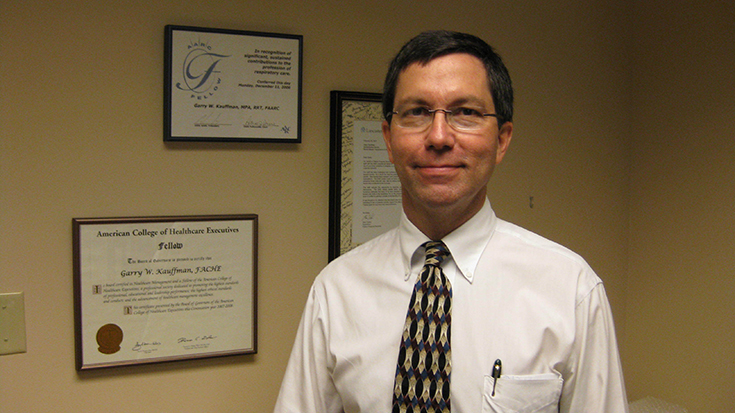
Deciding to strike out on your own and start a consulting business focusing on the needs of respiratory care departments certainly isn’t for the faint of heart. But for a select few RTs who have the right background, education, and experience it is a career move that can reap rewards both professional and financial.
AARC Member Garry W. Kauffman, MPA, RRT, FAARC, FACHE, tells us how he made the leap.
How long have you been an RT and what areas of the profession have you worked in during your career?
I started my RT career as a student at the York College-St. Joseph Hospital Program in Respiratory Therapy. The year was 1974, our Egan textbook was green, and the highest volume therapy was IPPB. I have been quite fortunate to work as a clinician, educator, and manager in respiratory care, as well as a service line leader, PI leader, and in other roles in acute care hospitals, a physician practice, and LTACHs, for which my training in RT was most helpful.
When and why did you decide to leave traditional RT to become an RT consultant?
I actually have been doing consulting work on a PRN basis for over 30 years. The majority of my work has been to help RT leaders better understand their operations, apply the science that is the foundation of our profession, and to revise services and delivery systems to improve quality, safety, satisfaction, and financial performance.
Tell us a little about your current consulting business — who are your clients and what kinds of things do you do for them?
As a consultant who specializes in respiratory care, the vast majority of my work involves helping RT leaders improve their services to their hospital or health system. With RT leaders dedicating 70+ hours per week to managing their departments, many simply don’t have the time to review their operations and see where improvements may be possible.
For example, with the increasing financial pressures to document productivity, I find that many RT leaders are being asked to achieve productivity targets that are unattainable—either because the incorrect metrics are utilized as the benchmark (e.g. procedures, CPT codes, or billable procedures) or that the benchmark was established secondary to stacking of therapies. In both cases, I advise RT leaders to create the value proposition for their departments based upon the clinical outcomes of their services rather than on getting the treatments done, as is so often the case.
What do you like most about working in this role?
This role provides the opportunity to help our most important stakeholders—our patients—by helping RT leaders and clinicians to demonstrate the value of their RTs and the services they provide. While we certainly have to ensure that our clinical staff are being efficient, we cannot forget that just being busy or providing services that aren’t effective are far more important issues to address in the big picture. The AARC has been extremely helpful to our RT leaders and clinicians both by publishing scientific articles that validate our services, such as protocols, as well as documenting services we practiced historically that don’t provide value (e.g. incentive spirometry).
Do you think this is something other RTs could accomplish as well? Why or why not?
With the increasing sophistication of health care delivery and the fact that the health system is changing more rapidly than ever in my career, it is imperative that RTs thinking about a consulting role have the education and experience of those who are contracting for consulting services. Administrative and physician executives expect, and privately demand, that the consultants have an earned a master’s degree and have documented success. The executive and physician leaders in the organization certainly don’t possess the depth of knowledge that an RT possesses for clinical services, but they expect the consultant to fully understand hospital operations so that they can work collaboratively with other consultants representing performance improvement, quality assurance, revenue cycle, and others.
What advice do you have for other therapists who might like to follow in your footsteps?
The best advice is to invest in your education and ensure that you have the knowledge required to be successful. Secondly, you should join the American College of Healthcare Executives so that you have access to what health care leaders are reading, what seminars they are attending, and what’s important to them. RTs have a rich history of providing high quality and cost-effective care and, like nurses, physicians, and other clinicians, can parlay some of their clinical acumen into other non-respiratory care operations.
Thirdly, it’s critically important that every consultant have an understanding of performance improvement and I would strongly suggest that you attain certification in Lean/6-Sigma because this knowledge will be essential to understanding and improving operations in each engagement. Finally, and it should go without stating, you need to be an AARC member and actively participate in educational programming at the local, regional, and national level to maintain your clinical and operational expertise as well as network with colleagues across the country.





